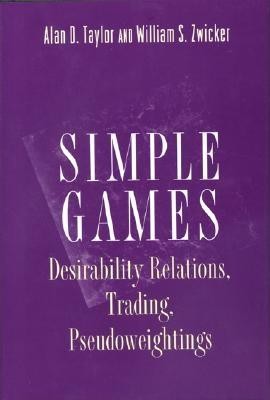
- We will send in 10–14 business days.
- Author: Alan D Taylor
- Publisher: Princeton University Press
- ISBN-10: 0691001200
- ISBN-13: 9780691001203
- Format: 16.3 x 24.2 x 2.3 cm, kieti viršeliai
- Language: English
- SAVE -10% with code: EXTRA
Reviews
Description
Simple games are mathematical structures inspired by voting systems in which a single alternative, such as a bill, is pitted against the status quo. The first in-depth mathematical study of the subject as a coherent subfield of finite combinatorics--one with its own organized body of techniques and results--this book blends new theorems with some of the striking results from threshold logic, making all of it accessible to game theorists. Introductory material receives a fresh treatment, with an emphasis on Boolean subgames and the Rudin-Keisler order as unifying concepts. Advanced material focuses on the surprisingly wide variety of properties related to the weightedness of a game.
A desirability relation orders the individuals or coalitions of a game according to their influence in the corresponding voting system. As Taylor and Zwicker show, acyclicity of such a relation approximates weightedness--the more sensitive the relation, the closer the approximation. A trade is an exchange of players among coalitions, and robustness under such trades is equivalent to weightedness of the game. Robustness under trades that fit some restrictive exchange pattern typically characterizes a wider class of simple games--for example, games for which some particular desirability order is acyclic. Finally, one can often describe these wider classes of simple games by weakening the total additivity of a weighting to obtain what is called a pseudoweighting. In providing such uniform explanations for many of the structural properties of simple games, this book showcases numerous new techniques and results.EXTRA 10 % discount with code: EXTRA
The promotion ends in 22d.06:25:10
The discount code is valid when purchasing from 10 €. Discounts do not stack.
- Author: Alan D Taylor
- Publisher: Princeton University Press
- ISBN-10: 0691001200
- ISBN-13: 9780691001203
- Format: 16.3 x 24.2 x 2.3 cm, kieti viršeliai
- Language: English English
Simple games are mathematical structures inspired by voting systems in which a single alternative, such as a bill, is pitted against the status quo. The first in-depth mathematical study of the subject as a coherent subfield of finite combinatorics--one with its own organized body of techniques and results--this book blends new theorems with some of the striking results from threshold logic, making all of it accessible to game theorists. Introductory material receives a fresh treatment, with an emphasis on Boolean subgames and the Rudin-Keisler order as unifying concepts. Advanced material focuses on the surprisingly wide variety of properties related to the weightedness of a game.
A desirability relation orders the individuals or coalitions of a game according to their influence in the corresponding voting system. As Taylor and Zwicker show, acyclicity of such a relation approximates weightedness--the more sensitive the relation, the closer the approximation. A trade is an exchange of players among coalitions, and robustness under such trades is equivalent to weightedness of the game. Robustness under trades that fit some restrictive exchange pattern typically characterizes a wider class of simple games--for example, games for which some particular desirability order is acyclic. Finally, one can often describe these wider classes of simple games by weakening the total additivity of a weighting to obtain what is called a pseudoweighting. In providing such uniform explanations for many of the structural properties of simple games, this book showcases numerous new techniques and results.

Reviews